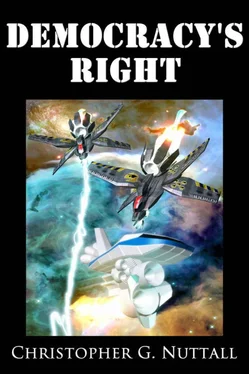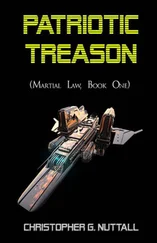An alarm pinged, seconds before the entire fortress shook. “Admiral,” he said, “a gunboat just flickered out of Shuttlebay Two!”
Percival turned his dead eyes on him. He didn’t seem to care, even though whoever was in the gunboat had not only cut through several levels of encryption that were supposed to prevent it, but risked the destruction of the entire fortress.
“Ignore it,” he said, harshly. “Prepare to engage the enemy.”
Alan made up his mind. “Admiral,” he said, carefully, “I hereby relieve you of command under Section IR-23 of Imperial Navy Regulations.”
Percival spun around to stare at him. “This is mutiny,” he snapped. Section IR-23 dealt with commanding officers who showed signs of madness. It was rarely used, not least because misusing it carried heavy penalties. “You are…”
He reached for the pistol at his belt and Alan leapt at him. Perhaps wisely, Percival had refused to allow his officers to carry weapons, but Percival was badly out of shape and in no condition for a tussle. Alan knocked him to the ground, picked up his pistol and used the butt to knock the Admiral out. No one moved to stop him, even though they knew that there were armed Blackshirts just outside the hatch. Something would have to be done about them. At the moment, Alan had no idea what. He had never considered mutiny, even as a private mental exercise.
“Contact the rebels,” he ordered. The officers moved to obey, leaving him wondering what to do next. “Tell them… tell them that we would like to surrender.”
He keyed the main command network. It demanded Percival’s identification, so he held Percival’s hand to the sensor and allowed it to read the implant concealed within his palm. The computer network opened up in front of him and he transmitted a surrender order into the datanet. He doubted that anyone would question it. They all knew the odds. Besides, he knew of no one besides Stacy Roosevelt who liked Percival.
“They’re acknowledging,” the communications officer said. “Marines are on the way.”
“Good,” Alan said. He checked the command hatch and sealed it with Percival’s authority. “And now all we have to do is hold out till then.”
“She’s stepped down her scans,” the pilot said, as the assault shuttles flew towards the massive orbital fortress. “I think the surrender is genuine.”
“Or they’re tracking us on passive sensors and they’re planning to blow us apart when we get into point-blank range,” another Marine put in. Wisecracking was an old Marine tradition, if only to serve as a barrier against tension, but few would argue that it sometimes went too far. “We might be the first to find out that it is a trick.”
Neil shrugged, knowing that the motion — and his scowl — would be invisible inside his armour. If the defenders intended to fire on the Marines, there would be no warning, not now that they’d gotten into energy range. Weapons designed to tear through starships and induce atomic fission in their component molecules wouldn’t have any trouble vaporising the Marine shuttles — and, as the blast would be moving at the speed of light, the first notice they’d have of its presence would be when the shuttles exploded.
The Imperial Navy didn’t have much practice at surrenders; wrack his brain as he might, he couldn’t remember the last time an Imperial Navy warship surrendered, unless he counted the mutiny Admiral Walker had led. No full-sized orbital fortress had ever surrendered to an outside force, not when the First Interstellar War had promised nothing, but destruction for humanity. Whatever the Dathi had in mind for humanity, in an alternate reality where they had won the war, their treatment of prisoners of war had been appalling. Humanity hadn’t taken long to return the favour — and grow out of the habit of trying to take prisoners. It was quite possible that it was a trick, although God alone knew what Percival thought he could get out of it. Perhaps he was thinking of the chance to take some hostages of his own, or maybe a few bargaining chips? There was no way to know for sure.
His lips twitched humourlessly. Percival had no way of knowing, but each of the shuttles carried a full-sized warhead powerful enough to damage the station if it was detonated inside the shuttlebay. It wouldn’t be enough to break through the armour if detonated on the hull, yet if it went off inside the fortress it would wreck the entire station. No one was sure if the station would actually survive, but it would definitely render the station useless for the foreseeable future. It would probably not be worth attempting to repair the station at all.
He peered though his implants as the station grew closer, growing larger and more daunting all the time. The station’s mass was relatively equal to a superdreadnaught’s, but its boxy exterior was covered in weapons and point defence systems. He knew, from previous exercises, that the interior of the station was designed to resist a boarding party as much as it was designed to make fighting off an invading fleet relatively simple. The Imperial Navy used comparable stations to hold down rebellious worlds and, from time to time, resistance groups had managed to get armed fighters onboard. Neil had investigated one such action seven years ago and had concluded that the rebels had succeeded through paying hefty bribes.
“They’re opening the main shuttlebay for us,” the pilot said. “They’ve opened the flight management system to my computers and there is no sign of trouble.”
“Ah, but there wouldn’t be, would there?” Neil asked. He glanced down at the plan of the rotating station in his HUD. “Tell them that we are diverting to Shuttlebay Four” — a shuttlebay closer to the station’s command centre than the main shuttlebay, normally only used for inspection flights — “and that we will be docking in two minutes.”
“Yes, sir,” the pilot said. He didn’t question Neil’s order, for it was a common boarding practice when Marines boarded potentially-hostile ships. If the station’s crew had arranged any unpleasant surprises for them, the Marines wouldn’t oblige them by coming in the entrance they’d selected. “They’re opening the other shuttlebay for us now.”
Neil felt the tension rise as the shuttle rose up towards a glowing hatch and flew into the station. Normally, the station would have insisted on using a tractor beam or a gravity field to ensure that there were no accidents, but there was no way he would have agreed to that when boarding a station. Instead, the pilot put them down on the deck, using the shuttle’s drive fields, and the Marines dived out of the craft and onto the deck. No hail of fire greeted them. There was no one there at all, apart from a single crewman who was looking rather bemused.
“Welcome onboard,” he stammered. Neil smiled to himself. The surrender might have been sent out in Percival’s name and none of the other stations would dare object, but the command station — he wondered, absently, if the station had a name — had suffered what was, in effect, a mutiny. The whole situation was dangerously unstable and could explode at any minute, which was why he’d brought four whole companies of Marines along and assigned them to the boarding party. “Ah… Commander Redfield sends his compliments and invites you to join him in the command centre.”
Neil grinned. He’d been right. No one knew how to surrender. The thought was almost amusing. It wasn’t as if there were drills for surrendering a station. “Good,” he said. “I’m afraid that more of my men are going to be boarding the station and securing vital locations. Please inform Commander Redfield that any resistance will result in harsh punishment. My people have orders to use deadly force.”
Читать дальше












